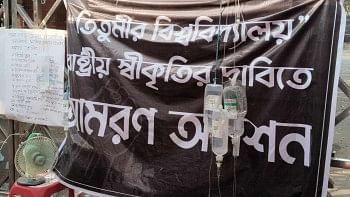Hilsa surge right after ban sparks controversy

Soon after the 22-day fishing ban on hilsa ended, a significant influx of hilsa fish appeared in local markets across the Barishal division.
However, locals suspect many of these fish were caught during the ban, a claim also hinted at by fisheries officials.
They also suspect fish traders have stored hilsa through various preservation methods, releasing them into the market immediately after the ban.
Just six hours after the restriction was lifted, at least 500 maunds of hilsa were spotted in Barishal's Port Road wholesale market.
Locals said many of these fish were discoloured and appeared frozen, indicating they may have been caught days earlier.
Liton Majhi, a trader who brought in 10 maunds of hilsa from Bhola by trawler, remained evasive when asked how he obtained such a large quantity of fish so quickly after the ban was lifted.
During a recent visit to the Port Road, various sizes of hilsa were found on sale. Traders reported prices of around Tk 68,000 per maund for larger fish, Tk 65,000 per maund for medium-sized fish, and between Tk 26,000 and Tk 58,000 per maund for smaller hilsa, depending on weight.
Prices have reportedly decreased by Tk 100-300 per kilogramme since the ban was lifted. Notably, larger hilsa remain rare, and most of the available fish do not contain eggs.
Abdur Rahim, a trader at Mahipur fish landing centre in Patuakhali, said hilsa availability in local rivers remains low, with only about 200 maunds observed.
Many fishermen have headed out to the sea, hoping for a better catch.
Barishal District Fisheries Officer Bimal Chandra Das confirmed a surge in hilsa on the market but noted that the fish are relatively small.
Fishermen are known to start fishing just before the ban ends, he added. He said most of these fish were likely caught legally.
Divisional Fisheries Officer Nripendranath Biswas said traders sometimes preserve fish independently and sell them post-ban.
He said they did not find any fish in the cold storage. "If any trader stored fish privately, we cannot do much about that," he added.
During the 22-day ban, the authorities conducted 3,394 operations and 1,100 mobile court sessions across the region. These efforts led to 681 individuals being fined and over 18 tonnes of illegally caught hilsa being seized, resulting in a total of Tk 32.97 lakh in fines, he said.


 For all latest news, follow The Daily Star's Google News channel.
For all latest news, follow The Daily Star's Google News channel. 



Comments